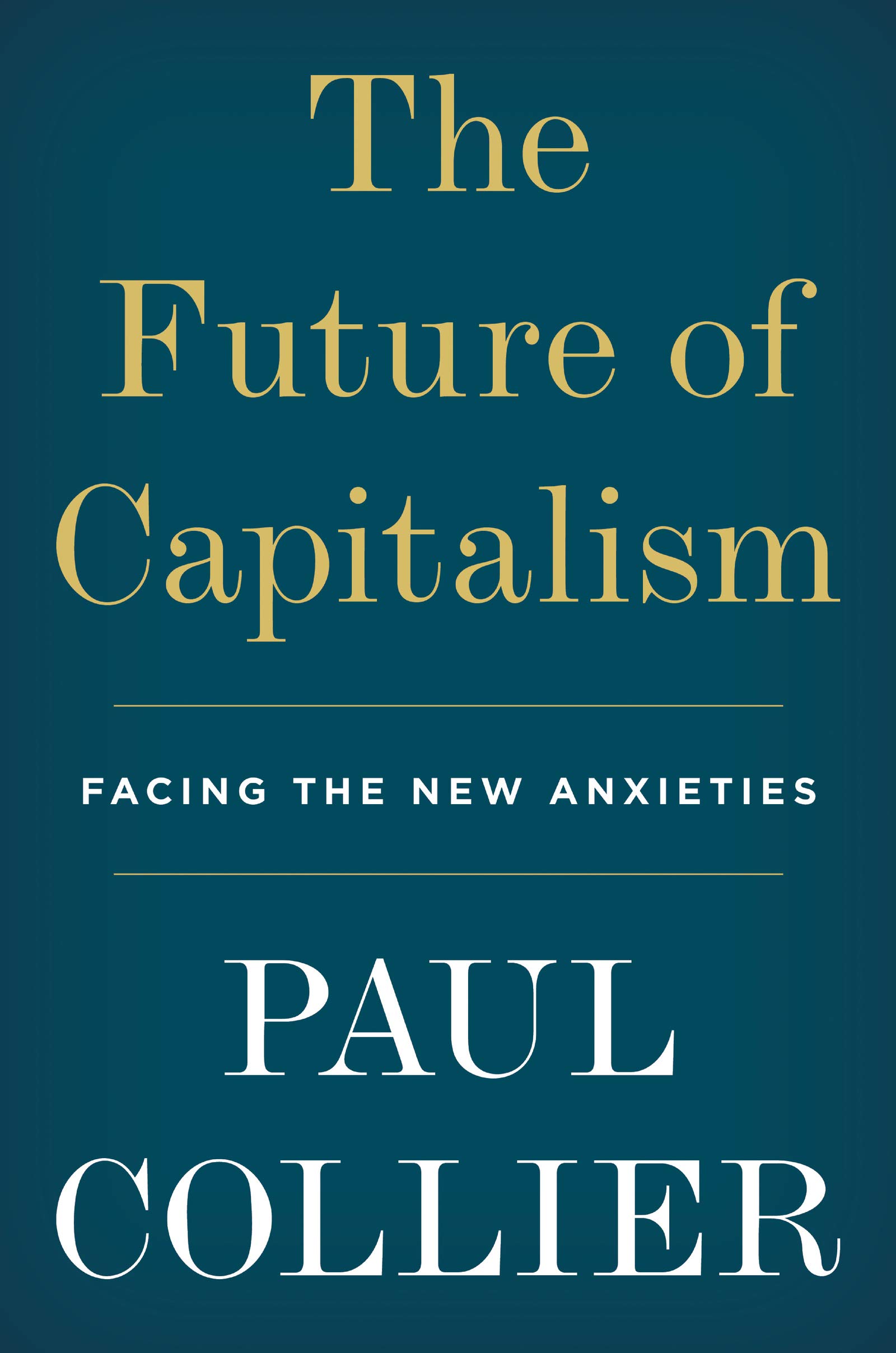Lord Griffiths: “The Future of Capitalism” by Sir Paul Collier

The Future of Capitalism tackles one of the big issues of our time. Its impressive author, Sir Paul Collier, CBE, FBA is a distinguished member of the Blavatnik School of Government at the University of Oxford and a seasoned practitioner in development economics for which he received a knighthood. He is convinced that capitalism is the only economic system which can generate mass prosperity. Regrettably it has also divided societies, created dysfunctional democracies and posed risks to the planet. More than that he claims it is morally bankrupt. The challenge he set himself in this book is how to restore ethics within capitalism to prevent it drifting into either a totalitarian state (China) or populist nationalism (East European countries). In doing so, he eschews ideology claiming that all his policy prescriptions are based on evidence, analysis and pragmatism.
The inspiration for the book was Anthony Crosland’s The Future of Socialism, published in the 1950s, which set an agenda for the social democracy of the post war years in the UK. (To some readers Anthony Crosland might seem a minor figure out of a history book, but in his heyday he was the leading UK intellectual of the centre left and a Cabinet minister in the Wilson and Callaghan Labour Governments attempting to put his ideas into practice). Collier claims that the Crosland agenda worked well between 1945-70, even at one point describing it as the “miracle period”. It failed however because it neglected its roots in the ethical foundations of the nineteenth century cooperative movement.
It was replaced by a combination of Utilitarian technocrats (mainly economists) intent on redistributing income to those below the poverty line (however defined) and lawyers committed to John Rawls philosophy which promoted the rights of disadvantaged groups based on race, gender, sexual preference and so on, which has become the basis for identity politics.
Both of these philosophical approaches emphasise the individual not the collective and differences between groups based on either income or disadvantage rather than the needs of persons and families. Each elevates a single moral prescription, “the greatest happiness of the greatest number” and “laws in a society must be designed for the most disadvantaged groups”. However, they neglect the normal moral instincts and values of people such as loyalty, fairness, obligation and desert which were central to the cooperative movement.
The philosophical foundation which Collier builds on is found in the writings of David Hume and Adam Smith (especially The Theory of Modern Sentiments) and the Pragmatism of nineteenth century American philosophers such as William James and Charles Peirce. After laying this down he devotes four chapters to restoring ethics within the state, firm, family and world. Then, in the final section he presents a plethora of ideas for restoring an inclusive society.
To tackle the geographical divide, he proposes taxing the metropolis and regenerating broken cities and regions through establishing local banks, local universities and business zones. Families can be strengthened by preventing them from falling apart in the first place, supporting children in the early years, from pregnancy to the first day of school, raising standards of teaching in schools, offering improved post-school vocational education and extending home ownership. Tackling the negative effects of globalisation requires redistribution of resources to those areas which have lost out through free trade and technology.
In putting forward all these proposals he is not afraid to be controversial. He is scathing about the greed of investment banks. He argues for taxes on financial transactions and raise taxes on the incomes of highly skilled workers especially in finance and law. He wishes to see a new criminal law comparable to manslaughter which he calls bankslaughter. He backs immigration controls, strengthening traditional two parent families from whom they are genetically descended and having less state intervention through social policy dealing with the needs of children.
Although it is not fundamental to the main theme of the book I question Collier’s judgement that the period 1945-70 was as successful as he claims. It is certainly true that the new social contract devised by Beveridge, Temple and others which produced the post war Welfare State and mixed economy lasted the course. However, by the 1960s inflation was back accompanied by rising unemployment, prices and incomes policy were a failure and the nationalised industries were mired in the red, while by the end of the 50s the social infrastructure began to show signs of fraying through increased violent crime, illegitimacy and addiction. Meanwhile, some of Crosland’s policies were proving destructive; “If it’s the last thing I do, I’m going destroy every fucking grammar school in England. And Wales. And Northern Ireland”. By the time of his early death (58 years old) he became so disillusioned with the crisis of capitalism that he thought the creation of a ‘serious revolutionary socialist party’ was worth thinking about.
One question which needs to be asked is whether he has succeeded in the task he set himself, namely restoring ethics to firms, families and states. In the case of firms he devotes an interesting chapter to the way in which ethical firms of the past which he mentions – Imperial Chemical Industries (ICI), Cadbury, The Halifax Building Society – have given way to the vampire squids of today which are held in contempt as greedy, selfish and corrupt.
In order to achieve change he believes competition is an important discipline on business but increasingly limited because of the power of networks (electricity, water, railways) and the role of technology in creating unregulated natural private monopolies (Facebook, Amazon, Google, eBay and Uber). The conventional responses to these problems are regulation and public ownership, but both have severe limitations. As an alternative he suggests taxing economic rent, which by definition does not discourage productive activity or risk taking; reforming corporate law so that concern for the public interest should be mandatory for all board members, such as Public Interest Companies in the US; and introducing the new criminal offence of bankslaughter.
The problem with all these, which he recognises is that regulations can be got around by talented management, taxes reduced by clever accounting and laws fudged by legal argument. After acknowledging that the cupboard is fairly bare he puts forward the novel suggestion that society needs to build a critical mass of ethical citizens who can judge the behaviour of companies, favourably or not. This is less than a specialised sub-police force and more a form of neighbourhood watch strengthened to have teeth. This may seem fanciful but the achievement of the women’s movement and climate change protests, based on evidence of discrimination or degradation show that great oaks grow from acorns. Post COVID-19 many questions will be asked about the future of our society, so his proposals may not be so fanciful.
To restore ethics to the state he rejects ethnicity, religion and shared values as a way to create shared identity because they are incompatible with modernity, despite the showing of how popular Judeo-Christian based ethics still remain. He plumps for a sense of belonging to place, something which is hard-wired in our psyche, especially the place in which we grew up and which we call home. Unlike Nationalism, Patriotism is an inspiring concept and he claims a good example of it is found in the politics of President Macron. A major raison d’etre of politicians should be to create narratives of shared belonging. To restore the ethical family, he suggests a greater acceptance of mutual obligations by parents in raising children rather than one focused on their own individual, personal success in work.
The one surprising weakness of the book is its treatment of religion. The book contains four references to religion and six to religious fundamentalism. All are wholly negative: religion leads to cultural separation, marriage is tainted by its religious association, it is the basis of a new nationalism, heir to fascism. Religion is almost always qualified by the adjective “extreme”. Jihad pogroms and other cultic, barbaric practices deserve the treatment he delivers and the Christian religion has many shameful episodes in its history. However, if restoring ethical behaviour in business, politics and society requires ethical citizens, ethical politicians and ethical family members, a rejection of self-aggrandisement, ‘freedom is not bound in servitude to the self but in escape from the self’ (p. 108), and strengthening a sense of obligation, surely a religion based on transcendence and true humanism must be a help to the cause.
On the evidence of nineteenth century history in the work of Gertrude Himmelfarb and Christie Davies, the irony is that ICI, Cadbury and The Halifax Building Society were deeply rooted in a late nineteenth century Christian culture, especially non-conformist, which was also an inspiration for the cooperative movement, friendly societies and the social reforms of the period. Non-conformity would also at this time have been a major force in Collier’s beloved Sheffield.
I enjoyed book but at the end it left me with a nagging question. It certainly respects the evidence, applies analysis to good effect and makes a number of interesting practical proposals. However, its conclusion is that religion has no place in the future of capitalism. In its neglect of the positive contribution of the Christian faith on British life and culture I fear it has strayed across the boundary of social science into ideology.
“The Future of Capitalism: Facing the New Anxieties” by Sir Paul Collier was published in 2018 by Harper Collins (ISBN 978-0062748652). 256pp.
Lord Griffiths is the Chairman of CEME. For more information please click here.

